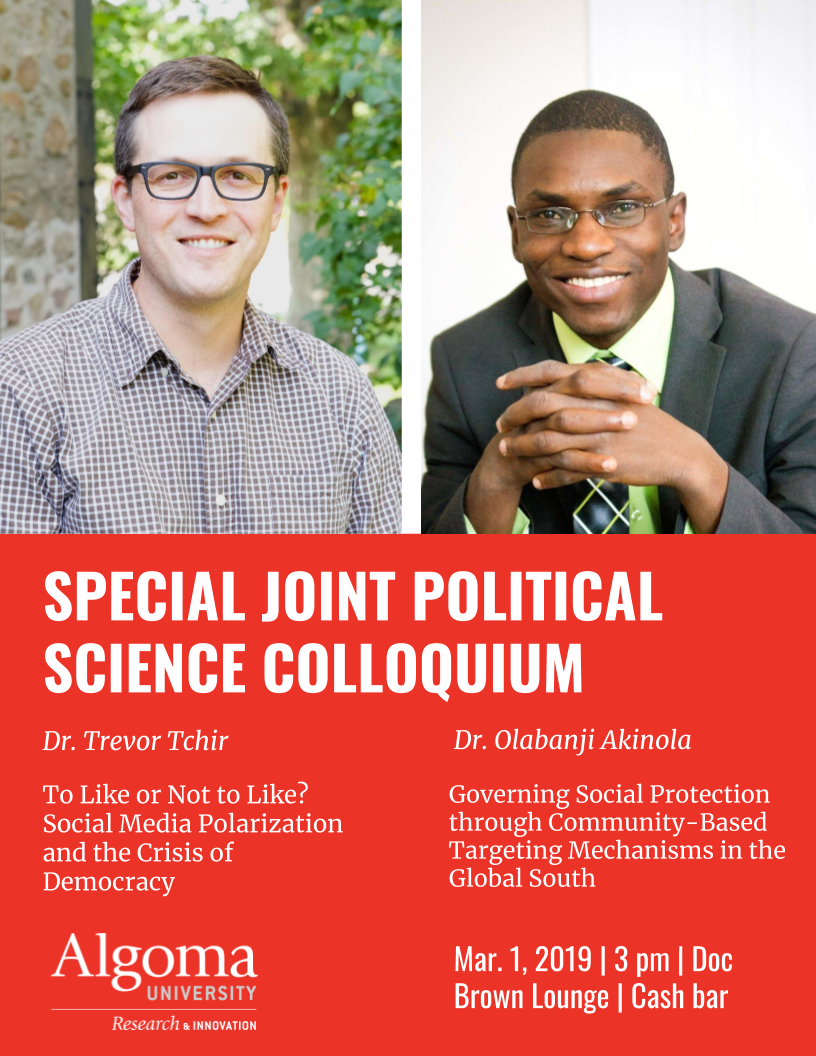
Office of Research & Innovation Colloquium Series
Please join the Office of Research & Innovation for a special joint lecture as part of our monthly colloquium series. The lecture will feature two of Algoma U’s poli-sci professors, Dr. Trevor Tchir and Dr. Olabanji Akinola. Dr. Tchir will be speaking on “To Like or Not to Like? Social Media Polarization and the Crisis of Democracy” and Dr. Akinola will speak about “Governing Social Protection through Community-Based Targeting Mechanisms in the Global South”.
Date: Friday, March 1, 2019
Time: 3 pm
Location: Doc Brown Lounge (EW 205)
A cash bar will be available.
—
Dr. Trevor Tchir – To Like or Not To Like? Social Media Polarization and the Crisis of Democracy
The rise of populism and the polarization of new media pose threats to pluralistic democratic action and judgment. Citizens often vilify each other, deny each other the space to test and justify their perspectives publicly, either because they hold radically different political views, or because they ascribe an essentialist identity upon the other, one that they believe must be negated in accordance with the logic of their own ideology. This presentation will present three vital resources in Hannah Arendt’s thought for addressing these challenges to democracy. First, Arendt promotes physical — not merely virtual or digital — spaces of public deliberation in which actors disclose “who” they uniquely are and the “world” that contextualizes their action. Arendt proposes a principle of resistance to totalitarianism and a “responsibility for the world” as the appropriate limit to free action within these spaces. Second, Arendt presents a limit, or standard of intelligibility, to political action and speech permissible in public: the sensus communis of Kant’s theory of aesthetic judgment. This standard of common sense, which binds the public sphere, demands that a speech act’s intersubjective validity appeal to an objectivity that can be shared from different perspectives, but which allows for disagreement, and is not as restrictive as an Aristotelian ethos or an internally consistent ideology. Finally, Arendt asserts the imperative of factual truth telling and attention to the details of public phenomena, as necessary conditions for intelligible action and judgment in a pluralistic public sphere.
Dr. Olabanji Akinola – Governing Social Protection through Community-Based Targeting Mechanisms in the Global South
Improving the governance of social protection programs generally, and ensuring transparency and accountability specifically, continues to be a main challenge to poverty reduction in many developing countries, especially at the community level where many poor and vulnerable individuals and households reside. To address this challenge, some countries are adopting Community-Based Targeting Methods and Mechanisms (CBTMs). CBTMs are participatory governance mechanisms that involve state and non-state actors and institutions, including community members and local representatives, in the selection of “deserving” beneficiaries of social protection programs as well as in the delivery, monitoring, and evaluation of such programs at the community level. However, despite the increasing adoption of CBTMs, very few empirical studies have critically examined how CBTMs improve or impede transparency and accountability. With special reference to African countries, and using Nigeria as a case study, this presentation provides rare – and unique – insights into how CBTMs improve or impede transparency and accountability in Africa. The presentation is based on findings from a research study on a social protection program, the “In Care of the People” (COPE) Conditional Cash Transfer (CCT) program in Nigeria, which utilized the CBTM as a participatory governance mechanism in three rural communities in southwestern Nigeria.

